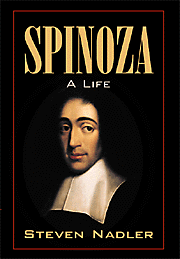Book contents
- Frontmatter
- Contents
- Acknowledgments
- Preface
- 1 Settlement
- 2 Abraham and Michael
- 3 Bento/Baruch
- 4 Talmud Torah
- 5 A Merchant of Amsterdam
- 6 Cherem
- 7 Benedictus
- 8 A Philosopher in Rijnsburg
- 9 “The Jew of Voorburg”
- 10 Homo Politicus
- 11 Calm and Turmoil in The Hague
- 12 “A free man thinks least of all of death”
- A Note on Sources
- Notes
- Bibliography
- Index
- Plate section
12 - “A free man thinks least of all of death”
Published online by Cambridge University Press: 05 August 2013
- Frontmatter
- Contents
- Acknowledgments
- Preface
- 1 Settlement
- 2 Abraham and Michael
- 3 Bento/Baruch
- 4 Talmud Torah
- 5 A Merchant of Amsterdam
- 6 Cherem
- 7 Benedictus
- 8 A Philosopher in Rijnsburg
- 9 “The Jew of Voorburg”
- 10 Homo Politicus
- 11 Calm and Turmoil in The Hague
- 12 “A free man thinks least of all of death”
- A Note on Sources
- Notes
- Bibliography
- Index
- Plate section
Summary
With peter balling, Simon deVries, and Adriaan Koerbagh gone, Spinoza's circle of friends in Amsterdam had, by the early 1670s, lost a significant core of its membership – even, for a time, its critical mass. Van den Enden had departed, too – off to Paris, where he was executed in 1674 for his role in the plot against Louis XIV. But there were still Bouwmeester and Meyer, who probably made the trip to The Hague to see Spinoza from time to time. Rieuwertsz was still around as well, although he was probably fairly busy with new publishing projects and with trying to keep his bookshop functioning under the vigilant eyes of the city authorities. And by 1674, these older acquaintances were joined by a second generation of eager Spinozists and fellow travelers, including Schuller, Pieter van Gent – a friend of Schuller's from their days of medical studies at Leiden – and, for a few months, Tschirnhaus. Thus, there probably continued to be an active group of Spinoza's “disciples” in Amsterdam throughout the 1670s, most likely meeting at Rieuwertsz's shop and carrying on the work of the circle from the late 1650s.
And then there was Jarig Jellesz. Ever faithful, he was, in the years 1673–4, slowly moving from his study of Descartes and of the Ethics to the Theological-Political Treatise, which he must have been reading in Glazemaker's unpublished Dutch translation.
- Type
- Chapter
- Information
- SpinozaA Life, pp. 320 - 352Publisher: Cambridge University PressPrint publication year: 1999



